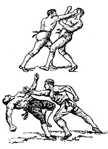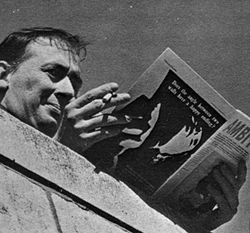|
|
||
 |
||
|
The J.G. Ballard – Harlan Ellison, ahh, misunderstanding...
From the JGB Chat Group.  David Pringle initially notes: Here's something interesting I've just rediscovered in looking through cuttings of old JGB interviews... David Pringle initially notes: Here's something interesting I've just rediscovered in looking through cuttings of old JGB interviews..."When US writer/editor Harlan Ellison was commissioning his anthology Dangerous Visions, which was designed to break every SF taboo in the multiverse, Ballard submitted as his entry The Assassination of John Fitzgerald Kennedy Considered as a Downhill Motor Race and his US agent was so appalled that he never even forwarded the story to Ellison in the first place. Ballard blamed Ellison for chickening out, and the resulting misunderstanding remained uncleared for some time." -- from "Waiting for Silver Coconuts," an interview with J.G. Ballard by Charles Shaar Murray (New Musical Express, October 22, 1983). Does anyone know anything more about this anecdote? Is it true that JGB's Kennedy piece was never even sent to Ellison? And does anyone know exactly when Ellison sent out his call for stories for the first Dangerous Visions anthology? I suspect it was in 1965 (the book appeared in 1967). I believe JGB wrote The Assassination of JFK Considered as a Downhill Motor Race in the late summer or autumn of 1965 – shortly after he had first read Alfred Jarry's The Crucifixion Considered as an Uphill Bicycle Race in Roger Shattuck's translation as included in Selected Works of Alfred Jarry, edited by Roger Shattuck and Simon Watson-Taylor (London: Methuen, and New York, Grove Press, 1965). In the event, of course, he ended up sending Ellison a quite different story, The Recognition, also written in 1965, and that's the one that appeared in Ellison's book. I'm intrigued, though, by the "misunderstanding" alluded to between Ellison and Ballard. Did anything else about this appear in print subsequently? Does anyone recall any details or rumours from the time?  Adrian Marley replies: I know that Ellison definitely talks about this in the introduction to Again, Dangerous Visions. Unfortunately, I don't have a copy of the books (it appeared as two volumes in the UK) to hand. What you describe is what I remember Ellison saying about it. There may have been more about it in the introduction but unfortunately I can't recall it. Maybe if someone has a copy of Again, Dangerous Visions they can find the relevent quote. Adrian Marley replies: I know that Ellison definitely talks about this in the introduction to Again, Dangerous Visions. Unfortunately, I don't have a copy of the books (it appeared as two volumes in the UK) to hand. What you describe is what I remember Ellison saying about it. There may have been more about it in the introduction but unfortunately I can't recall it. Maybe if someone has a copy of Again, Dangerous Visions they can find the relevent quote. Harlan Ellison, 1978 Harlan Ellison, 1978Lyle Hopwood responds: I have a copy of Again, Dangerous Visions. Here is the passage: "Only one author has vocally confessed to being upset with his participation in the project. I learned of that discontent only recently, and at risk of annoying the author and his agent, I really must relay the anecdote. "J.G. Ballard – easily one of the most innovative and serious contributors to the genre of speculative fiction – mentioned in an interview that he considered Dangerous Visions a hypocritical volume because I had asked writers to submit stories they felt could not be published in the traditional markets due to controversial content or approach, but when presented with it I had rejected The Assassination of John Fitzgerald Kennedy Considered as a Downhill Motor Race. "The interview, in a magazine called Cypher, quoted Jim Ballard as saying I had rejected the story-ostensibly written specially for Dangerous Visions – on the grounds it would offend too many American readers. When I read that item, I was horrified and stricken with a sinking-gut feeling... for I'd never seen the story. Though Ballard had, indeed, written it for the book, his agent in New York, instead of sending it on to me here in Los Angeles, had made a prejudgment that the story was offensive, and drawered it till they could return it to Ballard. Whether or not they contrived to advise Ballard I'd bounced it, I do not know, to this day. Subsequently, Michael Moorcock published the story in New Worlds in England, and it instantly drew the praise it deserved. "As one of the most exciting and controversial stories written in the field in recent memory, it would have been perfect for Dangerous Visions, and when I learned that I'd missed buying the piece because of a wholly unjustified clerical judgment, I ground my teeth in frustration. But to be accused of hypocrisy on top of the loss, was more than I could bear. Jim Ballard's story The Recognition in Dangerous Visions was a good story, a laudable piece of fantasy, but it simply wasn't in the same time-zone with Downhill Motor Race, one of the germinal stories of the past decade. "When I met Jim Ballard – in Rio de Janeiro in March of 1969 – we rehashed what had happened, and I thought we'd gotten the matter discussed, with mutual commiseration. Then came that Cypher quote. And though I've written him reminding him of the circumstances surrounding the "submission" of the story, there's been no reply. So if any of you out there run into J.G. Ballard, would you kinda sorta tell him what happened? I'd hate for him, or any of you, to grow much older thinking I was stupid enough to reject a story that clearly brilliant and noteworthy. I've been known to be stupid, but I refuse to cop to a charge of brain damage."  Harlan Ellison, 1975 Harlan Ellison, 1975While David Pringle finds the Cypher #3 interview: I have been emailed a scan of the J. G. Ballard interview, by James Goddard, which appeared in the fanzine Cypher #3, December 1970. So now we can see exactly what it was that Ballard said that Ellison reacted to. It's a fairly short interview, and marred by some misprints and obvious mis-transcriptions. It's explicitly dated to 12th November 1970, so Goddard obviously transcribed and published it fast -- in the issue of his fanzine dated for December. Ballard was evidently in pugnacious mood on that day, 12th November, and the following is the bit, in its entirety, which alludes to Ellison. You'll see that he's pretty negative about original anthologies in general, and he takes a swipe at Damon Knight too. On the other hand, he's very positive about the role of magazines (which should warm the cockles of some hearts on Fictionmags) -- even if he's exceedingly rude about one magazine in particular. I've tried to transcribe the following exactly as it is in the fanzine, including various solecisms and oddities of punctuation...  Goddard: At the present time the movement in SF is away from magazines and more toward the original anthologies like John Carnell's New Writings in SF, Damon Knight's Orbit, and Harlan Ellison's Dangerous Visions. Why do you think SF magazines have remained such a minority interest? Why should it be possible for a paperback to sell 30,000 or 40,000 copies, whilst a magazine like Vision of Tomorrow has difficulty in selling 15,000 copies? Goddard: At the present time the movement in SF is away from magazines and more toward the original anthologies like John Carnell's New Writings in SF, Damon Knight's Orbit, and Harlan Ellison's Dangerous Visions. Why do you think SF magazines have remained such a minority interest? Why should it be possible for a paperback to sell 30,000 or 40,000 copies, whilst a magazine like Vision of Tomorrow has difficulty in selling 15,000 copies?Ballard: There are certain to be fluctuations in the publishing of SF as in anything else. The 40s and the 50s were the great years of magazine SF, the 60s of the paperback original. I have always disliked original anthologies, which generally are bogus magazines, without the hot blood that runs through a real magazine. "Carnell's New Writings is a noble effort by the editor, Knight's Orbit series is workaday, but it's typical that he asked me in Rio last year to contribute, ...but not anything too original. While Ellison's Dangerous Visions is a vulgar travesty of the words in its title -- my own piece, The Assassination of JF Kennedy Considered as a Downhill Motor Race was declined on the grounds that ...many millions of Americans might be offended -- in the words1, dangerous, but not too dangerous, visions. "I think it is a great shame that the new SF cannot support a vital magazine and I lay the blame for this on the readers and new writers. Michael Moorcock's New Worlds has been one of the most original magazines ever published, and the history of New Worlds, from Ted Carnell's great editorship, when it was without doubt the most important magazine of original fiction in this country, to its present change into a paperback, is the history of original fiction of any kind in this post war period. I am convinced that SF, whatever form it takes, will continue to grow and change, and it can only change for the better, but without a magazine, and the commitance2 of people like Carnell, Moorcock and Platt, and others, the task of the young writer will be that much more difficult. Magazines are the best rallying points -- they have immediacy and direction, and the passionate involvement of one or two people. By contrast, the original anthologies are published within the machinery of a publishing house. As for Vision of Tomorrow -- it may well have had difficulty in selling 15,000 copies, but it would have just as much trouble in giving them away. At least, as a consolation prize, the editor can feel a certain pride in knowing that he produced, for a brief while, the worst science fiction magazine in history." Notes: 1. This should surely read "in other words" -- DP 2. This should surely read "commitment" -- DP Note how kind JGB is to Ted Carnell, who was still his agent, I think, in 1970 (though not for much longer, as Ted died in March 1972). Note also that he doesn't actually state that Ellison personally rejected his story, though he implies it. Nor does he state that the JFK piece was especially written for Dangerous Visions.  JGB in 1969: don't cross him. JGB in 1969: don't cross him.And then David Pringle proceeds to sum it up: Well, here's another little JGB quote for you, to round out the story: "Harlan Ellison... once unnerved me in the elevator of a Rio hotel by offering to demonstrate how to kill a man in the three seconds between floors." J.G. Ballard, "Zap Code" in New Statesman, March 25, 1977, pp 405-406: reviews of Approaching Oblivion by Harlan Ellison, Shadrach in the Furnace by Robert Silverberg, and Medusa's Children by Bob Shaw |
||